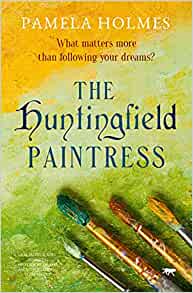Publishing your work is about being ready in case opportunity knocks. And learning the art of waiting.

I was on my bicycle when I saw him. AN Wilson walking across Regent’s Park. A man who knew about Victorian England. Just the man to know if my unpublished manuscript about a Victorian vicar’s wife who spent six years painting angels on the parish church ceiling was full of blunders and inaccuracies.
But should I approach him?
They say you make your own luck. So, I jumped off the bike and helmet still on head, asked if he might be willing to read my draft novel set in the Victorian period? He peered at me. Modest man that he is, he said he was not an expert. But yes, if I found a publisher for my work, he would read a draft. If I would find his view helpful, he was willing to offer one.
A year later, Urbane Publications said they wanted to publish ‘The Angel Ceiling’, as my draft novel was then titled. I sent it off to AN Wilson via his publisher and sat back. As is probably familiar to other writers, learning to wait is part of what’s necessary and required. Whether you’re submitting work to a literary competition, sending an email to a prospective agent or approaching a festival, not fretting is a skill that must be honed. Time passed; an email arrived. When I read AN Wilson’s congratulations on my work, I danced round the kitchen. This external verification made it easier to take the next step towards publication. I did not feel a total fraud putting my work out there.
For at this stage, I needed validation – do you recognise the feeling? I had a bad case of imposter syndrome and suspect some other writers know what I’m talking about. How could I write about those times if I was not a historian? Who was I to step into that different world and describe it? Some writers are confident about what they write and that’s brilliant. But it was not the way I felt. Although I kept reminding myself that I was writing a novel, it was important to me to check out that I had not, for example, given the characters things to do that were inconsistent with the time.
Not that novels, and in particular historical novels, are successful only because they portray an accurate picture of the time in which they are set. Characters, a sense of place, a compelling plot, the reasons why a book captivates readers are endless and impossible to list, as varied as the novels we read and love. Accuracy and authenticity are only two of the ingredients that make an historical novel work.
All this is on my mind as I finish my third novel. Set in the early eighteenth century, the story about the botanical illustrator Elizabeth Blackwell weaves fact and fiction. She became so successful that she settled her husband’s debts and rescued him from jail. Another woman who history has ignored even though her book, The Curious Herbal, is one of the finest in the British Library’s collection.
I’m hoping for another chance encounter to give me the reassurance that I’ve written a book that fascinates.
The Huntingfield Paintress by Pamela Holmes (Bloodhound Books) is available to buy here
I am the author of The Huntingfield Paintress and Wyld Dreamers (loosely based on my time living on a commune in Somerset) which are both published by Bloodhound Books. I am finishing a third novel, which will be published in October 2022. I write short stories (won the Jane Austen Short Story Award 2014). I run writing workshops and I have spoken and been interviewed at literary events. I am represented by the literary agent Laura Morris.
Website: https://www.pamela-holmes.com/ | Follow me on Twitter @Pammieholmes
Comments